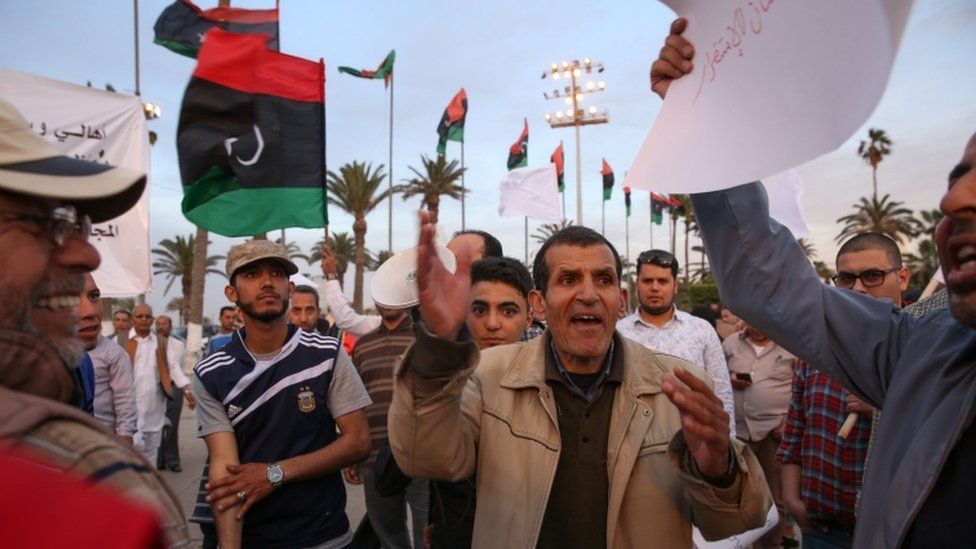Libya: UN to 'lift fund sanctions' if government regains control
- Published

The UN has said it will consider lifting sanctions on Libya's sovereign wealth fund if a UN-backed government can regain control of the country.
The sovereign wealth fund contains an estimated $67bn but has been restricted by sanctions since 2011.
The UN-backed unity government arrived in Tripoli on Wednesday but remains confined to the capital's port area after reports of gunfire in the city.
The new government is opposed by the coalition that controls Tripoli.
Over recent days, the city's airspace was intermittently closed to stop the new government, which has been based in neighbouring Tunisia, from arriving by air.
In a televised address, the head of the Tripoli authorities, Khalifa Ghweil, said he regarded the politicians as interlopers and said they were not welcome.
He urged "the illegitimate outsiders to surrender and be safe in our custody or to return to where they came from".
If the unity government can regain control of Libya, the UN's 15-member security council has pledged to lift an asset freeze on the Libyan Investment Authority (LIA).
The freeze was imposed in 2011 to prevent former leader Muammar Gaddafi removing funds from the country.
The security council unanimously renewed sanctions on Libya on Thursday and requested the new unity government confirm "as soon as it exercises sole and effective oversight" over the LIA, National Oil Corporation and the Central Bank of Libya.
But it is not clear how the unity government will be able to take over state institutions in Tripoli, given the stiff opposition they face.
Libya has been in chaos since the 2011 overthrow of Gaddafi by Nato-backed forces.
From 2014 it has had two competing administrations, one in Tripoli backed by powerful militias and the other about 1,000km (620 miles) away in the port city of Tobruk.
Western powers have recognised the new unity government as Libya's sole legitimate government but it faces opposition in east and west Libya.
In December, some rival lawmakers signed up to the UN agreement to form a unity government, but the deal has not yet been backed by all the country's many militia brigades that formed after the uprising.
The deal saw the formation of a nine-member Presidency Council, which includes the unity Prime Minister Fayez Sarraj who arrived with some of his deputies at a naval base in Tripoli on Wednesday.
Mr Sarraj said it was time to turn a new page and reconcile, saying he intended to build state institutions and implement a ceasefire.
"Revenge, alienation, antipathy, and hatred don't build a state," the AP news agency quoted him as saying.
UN envoy Martin Kobler said the politicians' arrival in Tripoli - after at least two failed attempts to fly in - marked "an important step in Libya's democratic transition and path to peace, security and prosperity".
US Secretary of State John Kerry said it was "not the time for obstructionists to hold back progress".